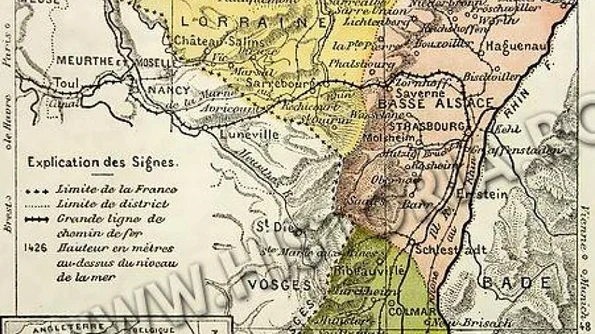
Alsace – Lorraine – the source of the Franco-German Dispute
In the second half of the 19thCentury, Prussia led and controlled the unification process of the German territories. The ascension of a new great power in the centre of the Continent alerted the French who feared that a unified Germany would endanger the geopolitical equilibrium established in 1815 at the Congress of Vienna. The Franco-Prussian War, a war in which France was defeated, developed against this background.
Bismarck opposed the annexation
One of the most important clauses of the Frankfurt Peace Treaty signed in May 1871 was the German annexation of certain territories from Alsace – Lorraine. This annexation was perceived as a punitive clause against the warmongering French, however, it caused a stir in Germany as well. Chancellor Bismarck was opposed to the idea, because he realized that the annexation of the French territories would lead to a permanent source of conflict between France and the new German State by producing a strong revisionist movement. On the other hand, Kaiser Wilhelm I supported the Prussian Army who was of the opinion (especially Helmuth von Moltke) that spreading the German borders further west was very necessary.
The demographic argument accounted publicly for the annexation:in Alsace – Lorraine the large majority of people spoke German dialects. More important, however, was the military aspect:should the German frontier be extended west, the Kaiserreich would have the strategic upperhand. The Germans would gain control of the Metz fortifications as well as over the iron ores in the region which were essential for the military industry.
The domestic policy of the German Empire played a very important part in this decision. Although it was effectively led by Prussia (the Prussian King was the heir of the Imperial Crown and the Prussian prime minister became the Chancellor), the new Empire was nevertheless a decentralized structure, which had some issues administering the new western Imperial territories (Baden and Bavaria).
These two states were enemies of Prussia until 1866 and after their integration in the German Empire, they received important concession whereas local autonomy was concerned (also in military issues which was unwelcomed by the Prussian generals). This way, the Prussian Chief of Staff was of the opinion that the new Franco – German frontier should be under direct Imperial control. The frontier should be pushed westward beyond the state borders of Baden and Bavaria. The new annexed territories were organized as a Reichsland (Imperial territory);although it was not officially integrated into Prussian territory, the Reichsland was under Imperial administration and it was controlled by Berlin.
The Revanche Movement – Revisionist trend in the French Third Republic which called for a foreign policy focused on the recovery of Alsace – Lorraine
Because of the Napoleonic wars, France did not enjoy a very good reputation among the Germans before the Franco-Prussian War. The German perceived the French as having an aggressive conduct of foreign policy and they feared their expansionist tendency. Yet, they were not too far from the truth:even in 1870, the French did not give up the dream of having an eastern frontier on the Rhine. It is safe to say that until the Franco-Prussian war, the Germans feared the French more than the French feared the Germans.
The new border between France and Germany went along the language lines separating the German and Romance dialects. This way, only a few areas with a French speaking majority (the Metz city, a region in the Vosges and the Château-Salins area) were transferred under German administration. In 1900, statistics revealed that French was spoken as a mother tongue by only 11, 6% of the population in the annexed territories. The Imperial administration was quite tolerant towards the French speakers by maintaining French as an official language.
According to the Treaty of Frankfurt, the population living in the annexed territories was able to choose to either emigrate to France or to remain in Alsace-Lorraine with a German citizenship until October 1st, 1872. Almost 100.000 people (5% of the population) emigrated to France until 1876.
The annexed territories have been added to the imperial province of Elsass-Lothringen under the administration of the Imperial Government in Berlin
Alsace-Lorraine became the main target of the Franco-German conflict during the WW1. As soon as the war began, both states took controversial decisions concerning this region. For instance, people from Alsace living in France were arrested and deported to concentration camps. The German authorities were aware of the predominant anti-German feeling in the region, yet they resorted to brutal measures against the population so as to avoid revolt attempts. Moreover, the Imperial administration immediately implemented a Germanisation policy in the area. In French-speaking city of Metz, the name of the streets were posted in both languages. However, since January 14th, 1915, the French language was erased from all markings;six months later, German was proclaimed the only official language of the region.
The Germans prohibited the use of French language
The measures of forced Germanisation led to alienation between the people of Alsace-Lorraine and the Imperial authorities. One could end up paying a fine for saying a simple Bonjourand non-native Germans were always ready to denounce somebody. This way, the French majority was controlled and almost terrorized by the German minority. It was no surprise that these measures backfired by causing the rebirth of the French nationalism.
The soldiers from Alsace-Lorraine were sent to the Eastern Front or enrolled in the Navy, in order to avoid possible conflicts with relatives from France.
Re-annexation
France re-annexed the lost territories of 1871 in the autumn of 1918, after the German surrender. The following year, the Treaty of Versailles officially acknowledged the French possession of Alsace-Lorraine.
Under the new French administration, Alsace-Lorraine was organized into three departments exactly as before 1870 – Haut-Rhin, Bas-Rhin and Moselle. The Government began a campaign of re-francization of the region through controversial measures (for example, the forced deportation of the Germans living in Alsace Lorraine after 1870).
The history of the region does not end here. The Germans re-gained control of the territories after the surprising French defeat in 1940. After the WW2, Alsace-Lorraine would remain definitively in French possession.















